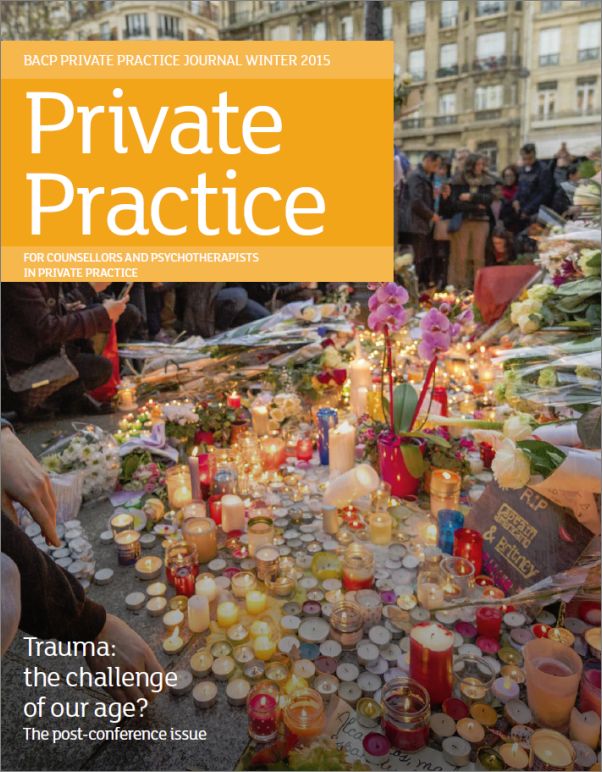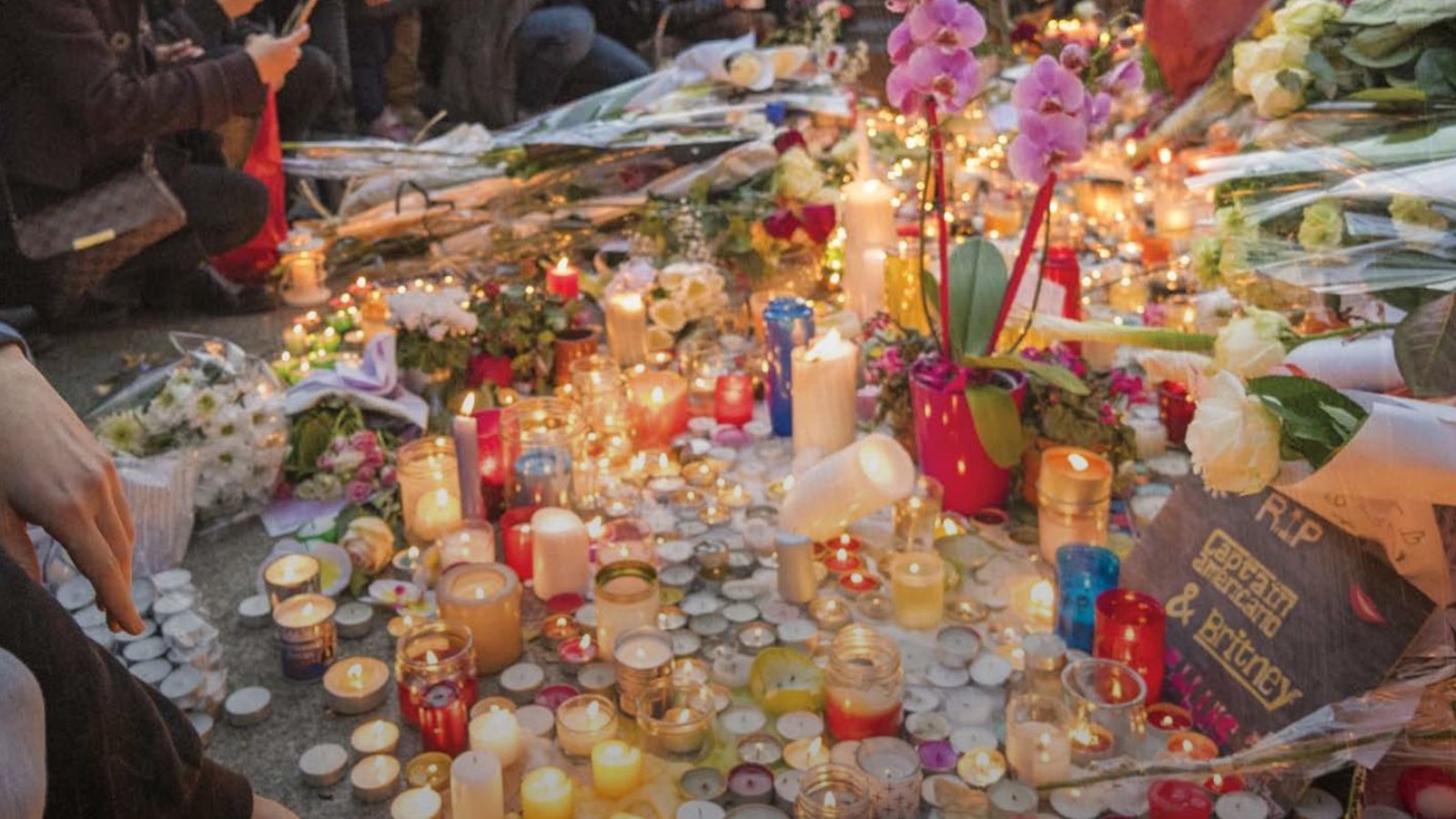In this issue
Features
My perspective
Spiritual support following trauma (free article)
David Wilbraham wonders if we ask how clients impacted by traumatic events have been affected spiritually
Ways of working
Is organisational trauma counselling for you?
Noreen Tehrani on working with crisis, disaster and trauma in organisations
Practice matters
Working with women diagnosed with BPD
Gillian Proctor outlines important considerations for private practitioners
Practice matters
Self-care in the face of trauma (free article)
Michael Gavin on the importance of therapist self-care when working with trauma
Practice matters
Soldier = PTSD?
Margaret Chapman-Clarke explores some misconceptions about military veterans
My perspective
Working with hacks
Mark Brayne argues that therapies that don’t address the traumatic causes of distress can be worse than useless
My perspective
Trauma and dissociation: a therapist as client
Katy Woodger on why private practice can provide an ideal setting for clients who dissociate
Practice matters
Transgenerational trauma
Haya Oakley on why trauma can be passed down through generations
Ways of working
Transgenerational trauma and EMDR
Derek Farrell explains why helping to lift the global burden of trauma will have far-reaching consequences for generations to come
Regulars

A pdf of this issue is available in the Private Practice archive
Welcome from the editor
If we take the Oxford English Dictionary definition of trauma as ‘a deeply distressing or disturbing experience’ and an ‘emotional shock following a stressful event or a physical injury’, with diverse causes and to differing degrees, as therapists in private practice, it is clear that we work with trauma in many of our cases.
We also work within a broader global political context in which humanitarian emergencies brought about through war, terrorism and the effects of climate change are causing suffering on an unprecedented scale to the lives of millions. The theme of this year’s BACP Private Practice conference, therefore, couldn’t have been more timely: ‘Trauma: the challenge of our age?’
In this expanded conference special issue we bring together articles from both of the keynote speakers and all seven of the workshop presenters, who consider the trauma theme from a range of different perspectives, including working with emergency service workers, military veterans and journalists; working with transgenerational trauma; working with women diagnosed with borderline personality disorder as a result of abuse or neglect; and Eye Movement Desensitisation and Reprocessing (EMDR) therapy for the treatment of trauma.
Fittingly, in light of the recent tragic events in Paris, we lead with an article by National Police Chaplain David Wilbraham, who reflects on the signs we see of communities uniting in the face of traumatic events to express collective feelings in ways that often have a spiritual component. Given this human need to come together in fellowship to find security and hope to counter the disorientation that comes with trauma, on an individual level, in our work with clients, David wonders if, in addition to the physical, mental and emotional support we offer, we ought also to consider the need for spiritual succour.
Etymologically, trauma derives from the Greek word for ‘wound’, which brings to mind the familiar archetype within our profession of the wounded healer. So often it is our own experiences of being wounded that have led us into this work, and I’m proud to be including in this issue an article by Katy Woodger who presents publicly, for the first time, her personal experiences of childhood sexual trauma and dissociation. Katy’s timing is intentional, given the current media coverage of high profile child sexual abuse cases. She writes of how therapy helped her to understand and manage her dissociative process, and argues persuasively that the person-centred approach, precisely because it eschews any expectation to fix, manage and reduce the level of risk and distress for clients, provides the ideal conditions for working with sexual trauma. Katy coined the term ‘awaremess’ to describe the process through which it was necessary for her to work, through pain and disturbance, within a solid and secure therapeutic relationship. She believes private practice can provide an optimum environment for this complex work.
Of course, working with trauma also affects us as therapists, and secondary traumatisation and burnout are a well-documented phenomenon within the profession. Michael Gavin, who specialises in working work with trauma, believes the risks are greatest for private practitioners because we have to play the roles of boss as well as therapist. To maintain the necessary conditions that underlie empathy, as well as our capacity to think and respond appropriately to our clients, it is we alone who matter first, Michael writes.
He also provides practical advice we should all be following on how to look after our own wellbeing, and the importance of acknowledging both parts of ourselves: the part that needs care and the part that has the capacity to support and nourish others. Remembering an important lesson he learned in life saving training as a teenager, he cautions: ‘…when you swim toward a person in distress there is a risk that in their panic they may grasp you so desperately that you both drown. I was taught both to approach with caution and to be ready with vigorous manoeuvres to subdue the “victim” so that I could effect the rescue rather than drown along with them.’
A personal note to end: on the day after the Paris shootings, I was on a busy London bus and noticed a backpack on the floor at my feet. It wasn’t clear who it belonged to and the thought flashed through my mind that it could be an explosive device. When I got off the bus and walked away I looked back at the sound of a man shouting. He was holding the bag in his hand, wanting to know if it belonged to me. I reflected on the risk he’d taken in picking up a potentially suspicious package. Then I was struck by his care in taking time to jump off the bus and return to me something he thought might be mine. Kindness prevailed on a day when London commuters going about their everyday lives might, like me, have been anxious and hypervigilant. Like the memorial candles burning brightly on the front cover, at this, the darkest time of the year, I’m grateful to end on a hopeful note.
John Daniel
Editor
privatepractice.editorial@bacp.co.uk
